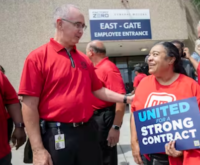By MICHAEL R. BLOOD
AP Political Writer
LOS ANGELES (AP) Most residents probably won’t notice.
A scant turnout is expected Tuesday when voters choose between two City Hall regulars who failed to bring much sparkle to the contest to succeed Mayor Antonio Villaraigosa, who exits office July 1 after two up-and-down terms.
Only one of four voters in the nation’s second most populous city is projected to cast a ballot, possibly a historical low. And the tightness of the race suggests a winner might not emerge on Election Day, and it might take days to count all the ballots.
Democrats Eric Garcetti, 42, a city councilman, and city Controller Wendy Greuel, 51, who could become the first woman to hold the job, occupy so much of the same policy turf they’ve been dubbed “Greucetti.” A steady stream of negative advertising from the campaigns and outside groups has helped obscure the candidates’ promises about free-flowing traffic, new jobs and better schools in coming years.
Voters will also judge three competing proposals to manage the city’s proliferation of pot shops, forcing residents to weigh the needs of the sick against complaints about crime around the dispensaries.
While some cities successfully managed pot collectives, Los Angeles fumbled and dispensaries sprouted across the city. Proposition D would cap the number of collectives that opened prior to 2007 _ about 135 _ and raise taxes slightly; Proposition E would cap the number at the same level but raise no new taxes; Proposition F wouldn’t limit the number of pot shops but put stringent controls such as audits and background checks on employees. It also raises taxes.
The proposition with the most votes wins, but only if it collects a majority. If none of the measures receives more than 50 percent of the vote, the issue could bounce back to the City Council.
Greuel and Garcetti emerged from a March primary in which no candidate secured the majority needed to win outright, leading to Tuesday’s runoff. Only about two in 10 voters went to the polls in that race.
The mayoral contest that has seen record spending, over $30 million overall, and the outcome will swing on appeal with key voting groups, including blacks, Latinos and women, and turnout in the San Fernando Valley, South Los Angeles and other battleground neighborhoods.
Greuel Monday sent off a final round of recorded endorsements from former President Bill Clinton _ she once worked in the Clinton administration _ while Garcetti was on campaign stops arguing a simple point: the election matters.
The lack of public interest runs counter to what’s at stake. A key issue has been the city’s shaky $7.7 billion budget and the prospect of living with less. Spending is projected to outpace revenue for years, and rising pension and retiree health care bills threaten money that could otherwise go to libraries, tree-trimming and street repairs. Villaraigosa is urging his successor to try to block a 5.5 percent pay increase for civilian employees.
With so much common ground on policy, the race became a duel over character issues as well as a referendum on who is closer to politically powerful municipal unions often criticized for landing generous raises and benefits.
Garcetti’s commercials labeled Greuel “DWP’s mayor,” a reference to the Department of Water and Power, whose workers are financing ads to help install her at City Hall. Greuel’s attack ads have hit Garcetti for a fundraiser organized by a developer who she says once served prison time for fraud.











